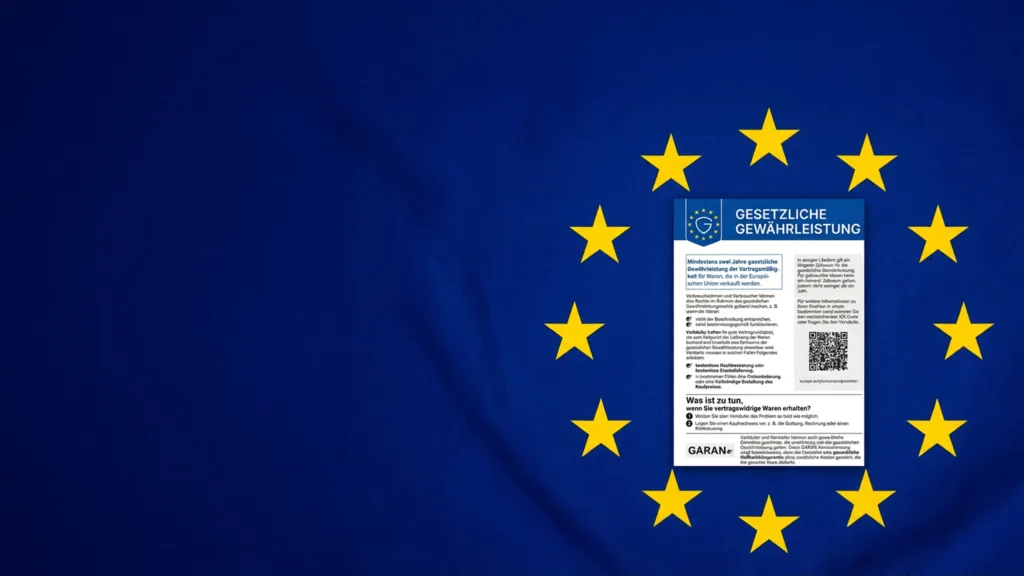
Guarantee
Madness
of the EU.
Guarantee
Madness
of the EU.
from
Instead of reducing bureaucracy or easing obligations for companies, the EU is creating new, detailed information requirements for online retailers. These new regulations are completely excessive paternalism that can cause retailers a lot of trouble without strengthening consumer protection.
New obligation to provide warranty information
With Implementing Regulation 2025/1960, the European Union has created a new standard for information on statutory warranty law and commercial durability guarantees. What should actually be a step towards greater clarity, however, turns out to be a remarkably fragmented regulatory architecture. Retailers who sell consumer goods are obliged to use a harmonized message that may not be changed in its design – right down to the color of individual lines and the exact ratio of text to QR code. This sounds like order, but in practice it means one thing above all: tedious detailed work in places where companies were previously able to work efficiently.
Background
The regulation is part of a larger reform project that aims to standardize information paths in consumer law. The reason for this was the widespread assumption that consumers do not sufficiently understand key terms such as “warranty” and “guarantee”. The legislator wanted to remedy this – with a uniform presentation throughout Europe that looks the same everywhere and conveys the same content.
This approach is not new. What is new, however, is the stringency with which this uniformity is enforced. The harmonized communication may not be reworded, visually adapted or graphically altered. Even the color codes are mandatory. This means that the instrument, which was actually intended to provide guidance, has itself become completely over-regulated, demanding one thing above all: absolute adherence to standards.
How information must be provided in future
The Commission not only prescribes what must be said, but also details what it should look like, namely as follows:
The pattern contains fixed text modules and graphic elements whose position may not be moved. QR codes must be technically generated in a way that is legible at all times. Online stores are required to use color versions in which retailers are given detailed color values in CMYK.
The regulation contains the remarkable sentence that the elements of the communication are “not editable”. In legal terms, this means that any deviation – be it of a design, linguistic or technical nature – can ultimately constitute a breach of the duty to inform. From a practical point of view, however, this approach leads to a paradox. The Commission wants to avoid misunderstandings by reducing diversity. However, the method chosen for this purpose itself creates a remarkable complexity.
While consumers will see a formally standardized information sheet in the future, companies are faced with the problem of having to create and correctly integrate this information sheet in the first place. Smaller retailers in particular, who have neither internal legal departments nor design teams, will be confronted with a wealth of requirements that are unusual in their level of detail – even for EU regulations.
What does this mean for companies?
Companies must adapt their systems by 27.09.2026 so that the message is displayed in an unchanged form in accordance with the model – multilingual, true to color, QR code-capable. Retailers who sell throughout Europe must have several language versions available and at the same time ensure that the technical integration works on all devices.
Conclusion
The new rules on information obligations are the opposite of reducing bureaucracy. They are a complete overregulation that can lead to cease and desist letters under competition laweven for deviating color values.
At the same time, the EU has so far only provided an image of the template that retailers cannot adapt. Retailers must therefore see how they can create an identical design with their own details.
Regardless of the criticism of the regulations, retailers must implement them by 27.09.2026, unless the EU comes to its senses before then.
We are happy to
advise you about
E-Commerce!







